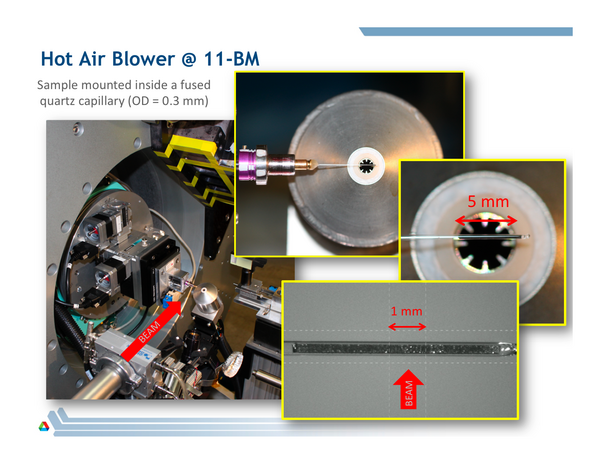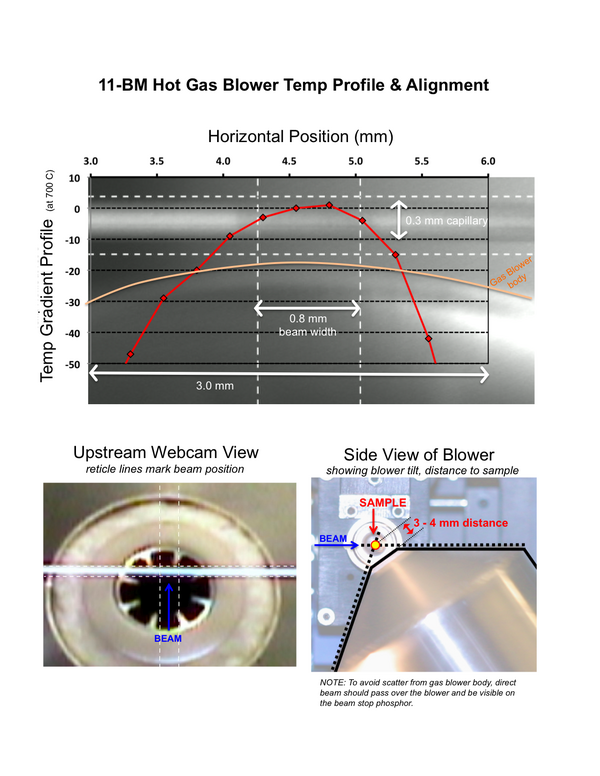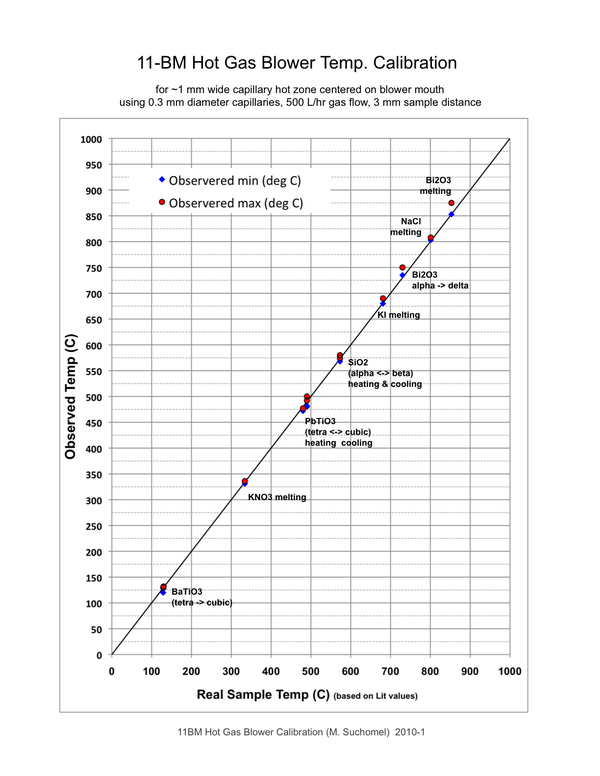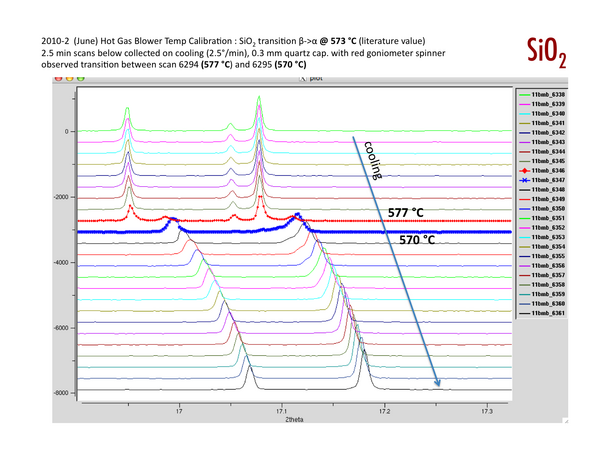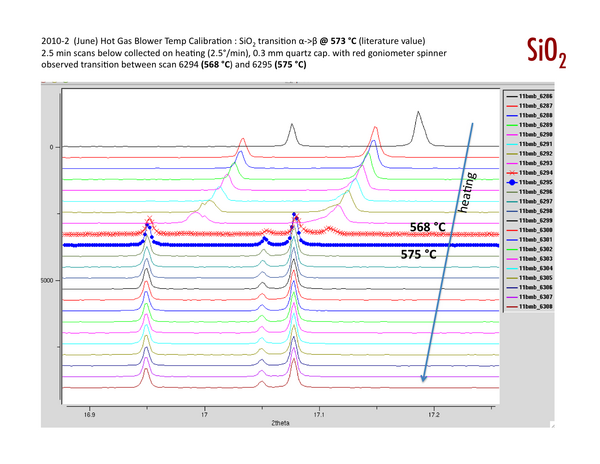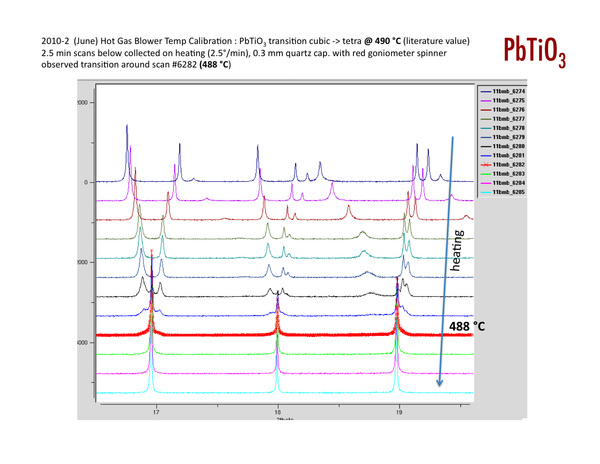Difference between revisions of "Hot Gas Blower (Cyberstar)"
| Line 24: | Line 24: | ||
=== Al2O3 Thermal Expansion === | === Al2O3 Thermal Expansion === | ||
In-situ calibration of the hot gas blower was performed | In-situ calibration of the hot gas blower was performed using the known thermal expansion of Al2O3 alumina ''a'' & ''c'' unit cell parameters as a function of temperature. | ||
Full diffraction patterns were collected for select | Full powder diffraction patterns were collected for select "nominal" set temperatures between 100 - 950 C at 11-BM using a X.X mm diameter fused quartz capillary load with ??? Al2O3 powder. | ||
Refinements were performed against data from each nominal temperature to determine ''a'' & ''c'' unit cell parameters. | |||
Based on the initial room temperature 25 C lattice values and published thermal expansion equations (below, see Reference 1), "real" observed sample temperatures were then calculated independently for each set of 'a'' & ''c'' unit cell terms. | |||
The thermal expansion equation used for the ''a'' axis of Al203 (range 293-1900 K) is: | |||
delta(a)/a (%) = -0.176 + (5.431E-4 * T) + (2.150-7 * T^2) - (2.810E-11 * T^3) (T/K) | |||
room-temperature lattice parameter is a = 4.7592 A | |||
The thermal expansion equation used for the ''c'' axis of Al203 (range 293-1900 K) is: | |||
delta(c)/c (%) = -0.192 + (5.927E-4 * T) + (2.142E-7 * T^2) - (2.207E-11 * T^3) (T/K) | |||
room-temperature lattice parameter is c = 12.9934 A | |||
'''Reference 1''' = J. Appl. Cryst. (1993). 26, 77-81 | |||
Finally, plotting observed vs nominal set temperatures for the Al2O3 data gives a correction curve and equation for other hot air blower under similar measurement conditions. | |||
These results (from July 2012) are showen below. | |||
Note: the 11-BM calibration data are kindly shared by Jae-Hyuk Her, GE Global Research. | |||
=== Phase Transitions === | === Phase Transitions === | ||
Revision as of 22:36, 24 September 2012
About
11-BM has a dedicated Cyberstar Hot Gas Blower. This can be used to heat small diameter capillary samples from ambient temperature to ~ 950 °C
About
Temperature Range and Ramp Rate.
- ambient temperature to ~ 950 °C
- Max ramp rate on heating & cooling is 5 deg C/min (300 C/hour)
Users should plan experiments to incorporate these heating and cooling ramp times.
11-BM Hot Gas Blower Image
Temperature Profile & Alignment
Temperature Calibration
Al2O3 Thermal Expansion
In-situ calibration of the hot gas blower was performed using the known thermal expansion of Al2O3 alumina a & c unit cell parameters as a function of temperature.
Full powder diffraction patterns were collected for select "nominal" set temperatures between 100 - 950 C at 11-BM using a X.X mm diameter fused quartz capillary load with ??? Al2O3 powder.
Refinements were performed against data from each nominal temperature to determine a & c unit cell parameters.
Based on the initial room temperature 25 C lattice values and published thermal expansion equations (below, see Reference 1), "real" observed sample temperatures were then calculated independently for each set of 'a & c unit cell terms.
The thermal expansion equation used for the a axis of Al203 (range 293-1900 K) is:
delta(a)/a (%) = -0.176 + (5.431E-4 * T) + (2.150-7 * T^2) - (2.810E-11 * T^3) (T/K) room-temperature lattice parameter is a = 4.7592 A
The thermal expansion equation used for the c axis of Al203 (range 293-1900 K) is:
delta(c)/c (%) = -0.192 + (5.927E-4 * T) + (2.142E-7 * T^2) - (2.207E-11 * T^3) (T/K) room-temperature lattice parameter is c = 12.9934 A
Reference 1 = J. Appl. Cryst. (1993). 26, 77-81
Finally, plotting observed vs nominal set temperatures for the Al2O3 data gives a correction curve and equation for other hot air blower under similar measurement conditions.
These results (from July 2012) are showen below.
Note: the 11-BM calibration data are kindly shared by Jae-Hyuk Her, GE Global Research.
